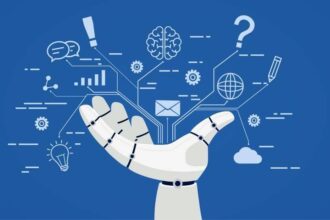Picture this: it’s been 12 years since you started your own business and you realize you’ve been doing it wrong. That’s what happened to Juliet Aurora. In a candid article for Intuit’s Firm of the Future, Aurora explains that “You have not created a business unless the business can run without you – you’ve only created a job for yourself.”
After 12 years on the job, Aurora realized her bookkeeping business couldn’t run without her. She’d created a job for herself instead of a functioning commercial entity with the ability to operate smoothly even when she wasn’t in the office.
But how is someone like Aurora, whose specialty is numbers, supposed to create a well-oiled machine of a business? You have to be able to hire the right people, and that can be extremely difficult when you’re running the business by yourself — resumes start rolling in and you have to use your precious time to go through them, contact candidates, and setup interviews. The short answer is AI as a perfect recruitment tool. Here’s why.
AI Can Search Massive Databases for Just the Right Candidate
If you’re a small business owner like Aurora, you may know just what you want in a candidate, but none of the resumes you’re receiving seem to match up. Disappointed, you realize you’re going to have to search for candidates online yourself, which takes legwork, and it means you’re not making any money because you’re still at the point where you’re running the business by yourself.
Ideal AI
One of the machine learning tools for recruiting and hiring is called Ideal. Based on criteria you provide, the program scans job sites like CareerBuilder and searches for the right candidates. This would work especially well if you needed to hire multiple people at the same time.
Ideal claims the AI has been trained on millions of previous hiring decisions from other companies, so even if a small employer doesn’t have a dataset to help the AI learn, Ideal can use experience from other employers to inform decisions.
Furthermore, Ideal claims it can remove bias from searches by ignoring information such as gender, name, and age. Ideal’s creators recognize that names can indicate ethnicity, which is a trap for recruiters who discriminate based on inherent bias.
As you continue to hire people, the software uses machine learning to analyze past applicants and their data as employees, and uses this information to predict which candidates are likely to succeed in the future.
AI Can Integrate with Applicant Tracking Systems (ATS)
ATS is an automation tool that filters out resumes based on keywords. Plenty of enterprises use ATS to do the simple legwork of narrowing down applicants based on which ones use the right keywords in their resumes.
However, applicants can craft resumes for ATS, meaning they’re putting in the right keywords in order to get past the gatekeeper. If the applicant really does deserve an interview, this isn’t a big deal, but if the applicant is dishonest with their use of keywords and dishonest in the interview, it can end up costing you a lot of money if you hire them.
AI can look at ATS data and pull from other data sources to get a more accurate take on the applicant. In other words, if there’s other accessible data about the applicant online — such as data about their last place of employment on LinkedIn — AI can reveal whether that data matches up with the applicant’s claims on a resume. This saves time for any recruiter, and the software can find more data in a shorter period of time than any human could.
AI Can Pre-Screen Candidates
Once you’ve culled a list of candidates, typically your next move is to call or email them with a number of standard pre-screening questions. Avrio is a program that incorporates a chatbot with the ability to do that for you.
Like Ideal, Avrio integrates with your ATS, and then — unlike Ideal — uses a Facebook Messenger chatbot called Rio to contact candidates. Rio will either suggest questions to ask, or will let you customize questions, or both. Based on information you provide, Rio can answer questions from candidates. Rio then provides you with a transcript of the conversation, and can even suggest a salary range.
AI Can Identify Passive Candidates
A passive candidate is someone who is interested in finding a new job but hasn’t gone on the job search yet. Particularly for tech positions, highly qualified candidates are going to be employed already — but they may have reasons to move on, such as dissatisfaction with culture. Several AI tools work to analyze factors that reflect this.
Engage Talent and Entelo both search the internet for candidates who are likely to change jobs. Entelo has 70 variables it uses to predict the likelihood of attrition by scanning 50 websites where candidates may be be found. Entelo finds qualified candidates and claims it can tell you which professionals are 30 percent more likely to change jobs within 90 days.
Engage Talent identifies five factors that influence the likelihood of attrition: company stability, business shocks, strong leadership, work environment, and growth opportunity. Once Engage identifies qualified candidates, it zones in on their browsing habits and allows you to target them with personalized recruiting ads at the right time.
AI Can Schedule Interviews
Lastly, Paradox Olivia and x.ai are assistants that communicate with candidates for you and integrate with your calendar to pencil in interviews. Olivia is a chatbot that will reach out to candidates from the get-go and screen them before setting up the interview. X.ai specializes in setting up meetings — the company says, “By signing up for x.ai, you’re not just hiring an AI, you’re helping create one.” X.ai employs two algorithms — ”Amy” and “Andrew” — that learn from interacting with humans.
Now, machine learning apps can do all the mundane tasks that HR managers and small business owners don’t have to time for. If you’re a small business owner and you don’t want to hire someone just so they can hire other people, AI might be just the tool for you. If you’re in charge of talent acquisition for a company, AI can augment and improve the work you do every day, which creates more time to truly focus on interviews and the interpersonal work you enjoy.











